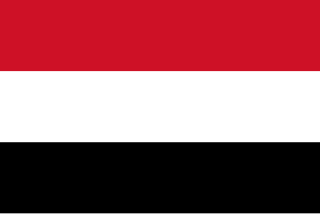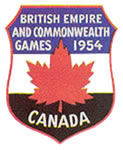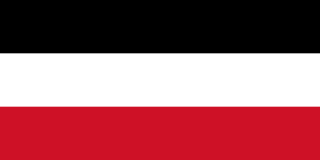
The Commonwealth Games is a quadrennial international multi-sport event among athletes from the Commonwealth of Nations, which mostly consists of territories of the former British Empire. The event was first held in 1930 and, with the exception of 1942 and 1946, has successively run every four years since. The event was called the British Empire Games from 1930 to 1950, the British Empire and Commonwealth Games from 1954 to 1966, and British Commonwealth Games from 1970 to 1974. Athletes with a disability are included as full members of their national teams since 2002, making the Commonwealth Games the first fully inclusive international multi-sport event. In 2018, the Games became the first global multi-sport event to feature an equal number of men's and women's medal events, and four years later they became the first global multi-sport event to have more events for women than men.

The State flag of Yemen was adopted on May 22, 1990, the day that North Yemen and South Yemen were unified. The flag is basically the Arab Liberation Flag of 1952, introduced after the Egyptian Revolution of 1952 in which Arab nationalism was a dominant theme. The Arab Liberation Flag of 1952 served as the inspiration for the flags of both North and South Yemen prior to unification, as well as for the current flags of Egypt, Iraq, Sudan, Palestine and Syria.

The national emblem of Yemen depicts a golden eagle of Saladin with a scroll between its claws. On the scroll is written the name of the country in Arabic: الجمهورية اليمنية or Al-Jumhuriyyah Al-Yamaniyah. The chest of the eagle contains a shield that depicts a coffee plant and the Marib Dam, with seven blue wavy stripes below. The flagstaffs on the right and left of the eagle hold the flag of Yemen.

South Yemen, formally the People's Democratic Republic of Yemen, was a state that existed from 1967 to 1990 as the only communist state in the Middle East and the Arab world. It was made up of the southern and eastern Governorates of the present-day Republic of Yemen, including the island of Socotra.

The Federation of South Arabia (FSA) was a federal state under British protection in what would become South Yemen. Its capital was Aden.

The 1954 British Empire and Commonwealth Games was held in Vancouver, British Columbia, from 30 July to 7 August 1954. This was the first event since the name change from British Empire Games took effect in 1952.

Aden Colony, also the Colony of Aden, located in the south of contemporary Yemen, was a Crown Colony of the United Kingdom from 1937 to 1963. It consisted of the port of Aden and its immediate surroundings.

The State of Aden was a state constituted in Aden within the Federation of South Arabia. Following its establishment on 18 January 1963, Sir Charles Johnston stepped down as the last Governor of Aden.

South Arabia is a historical region that consists of the southern region of the Arabian Peninsula in Western Asia, mainly centered in what is now the Republic of Yemen, yet it has also historically included Najran, Jizan, Al-Bahah, and 'Asir, which are presently in Saudi Arabia, and the Dhofar of present-day Oman.
The modern history of Yemen began with the withdrawal of the Ottoman Empire. In 1839 the British set up a protective area around the southern port of Aden and in 1918 the northern Kingdom of Yemen gained independence from the Ottoman Empire. North Yemen became a republic in 1962, but it was not until 1967 that the British Empire withdrew from what became South Yemen. In 1970, the southern government adopted a communist governmental system. The two countries were formally united as the Republic of Yemen on May 22, 1990.

The General Service Medal, is a campaign medal of the United Kingdom introduced in 1962 to replace both the General Service Medal (1918), as awarded to the Army and RAF, and the Naval General Service Medal (1915). The 1962 GSM was awarded until 2007, when it was replaced by the Operational Service Medal. In 2015 the General Service Medal (2008) was introduced.
Clifton Bertrand was a Trinidadian sprinter.

New Zealand at the 1938 British Empire Games was represented by a team of 69 competitors and 13 officials, including 18 athletes, 15 rowers, eight swimmers and divers, and seven each of boxers, cyclists and wrestlers. Selection of the team for the Games in Sydney, New South Wales, Australia, was the responsibility of the New Zealand Olympic and British Empire Games Association. New Zealand's flagbearer at the opening ceremony was Jim Leckie. The New Zealand team finished fifth on the medal table, winning a total of 25 medals, five of which were gold.

New Zealand at the 1962 British Empire and Commonwealth Games was represented by a team of 85 competitors and 11 officials. Selection of the team for the Games in Perth, Western Australia, was the responsibility of the New Zealand Olympic and British Empire Games Association. New Zealand's flagbearer at the opening ceremony was runner Murray Halberg. The New Zealand team finished third on the medal table, winning a total of 32 medals, ten of which were gold.

New Zealand at the 1966 British Empire and Commonwealth Games was represented by a team of 60 competitors and 18 officials. Selection of the team for the Games in Kingston, Jamaica, was the responsibility of the New Zealand Olympic and British Empire Games Association. New Zealand's flagbearer at the opening ceremony was weightlifter Don Oliver. The New Zealand team finished fourth on the medal table, winning a total of 26 medals, eight of which were gold.
Hilton Wallace Brown is a New Zealand swimming coach and former competitive swimmer who won a bronze medal for his country at the 1966 British Empire and Commonwealth Games.
This is a survey of the postage stamps and postal history of Yemen.

The National Liberation Front was a Marxist paramilitary organization and a political party operating in the Federation of South Arabia, during the Aden Emergency. During the North Yemen Civil War, fighting spilled over into South Yemen as the British attempted to establish an autonomous colony known as the Federation of South Arabia. Following the exit of the British armed forces, the NLF seized power from its rival, the Arab nationalist Front for the Liberation of Occupied South Yemen (FLOSY). In the aftermath of the Emergency, the NLF renamed itself the National Front and eventually became the main force behind the creation of the Yemeni Socialist Party which subsequently governed the country as a single-party Marxist-Leninist state.

The Front for the Liberation of Occupied South Yemen was an Arab nationalist military organization operating in the Federation of South Arabia in the 1960s. As the British tried to exit, Abdullah al Asnag created FLOSY. FLOSY attempted to seize power when the British left from another military group operating in South Arabia, the Marxist National Liberation Front (NLF).
The Aden Trade Union Congress was a trade union in the Aden Colony, a British protectorate in Yemen.














